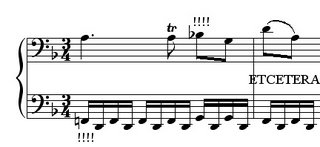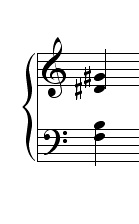I had plans, magnificent plans! I was playing a four-hand work with a certain music director of the San Francisco Symphony (anonymous of course), a beautiful slow movement which is one of those marvels of Mozartean simplicity. But, content on the reprise I was not. I yearned, the second time around, to fill its basic intervals with elaborations, like a chocolate bar with nougat, and said music director encouraged me at our first rehearsal, averring that by historical accounts Mozart ornamented heavily ... that it was "like Chopin." Haha. I barely need encouragement in general, in almost every facet of my existence, so watch out! The next day, submerged in the pit under the Davies stage, I spent my "practice breaks" concocting ornaments... like Christmas ornaments really: some quite cheesy, some unnecessary, some beautiful, some graceful, some edible (?) and some making you wish you had never come home for Christmas at all. I laughed and giggled and generally ridiculously entertained myself, which calls to mind the magnificent line of Homer Simpson: "But I was getting lonely being happy all by myself."
The point was I was going to be an audacious ornamenter, and catch Anonymous Music Director by surprise onstage, etc. I used just a few of my ornaments at our dress rehearsal, and even this mere sampling elicited the following remark: "Jeremy, what have you been smokin' the last few days?" This I considered a success; yes, it's a slightly different kind of success from what most people yearn for, but we all set our bars in different places, so to speak. So, anyway, I was feeling very pleased with myself, but as usual, the first night I didn't really have (to use the vernacular) the cojones to do everything I had planned; I did some things but couldn't go "all the way."
The second night, there we were in front of a couple thousand people again, and I was ornamenting away, self-satisfied, and we got to the second half, where I play this little new theme in D major, all alone:

Yes, it's a very nice theme. And after my little treble "solo," very adorably the bottom part is supposed to play the same thing in a bass-ish kind of way, and it's all very cute and humorous. Now, only later I came to understand the motivation behind what happened next. Apparently, I played my theme that evening particularly Puckishly and optimistically, like a kind of "in the mist" fantasy of treble frequencies, and this music director had had it with my demonstrative happiness. Instead of the major mode, then, the music director played his version in a sober, sad minor, something like "Let me tell ya somethin' punk, you need to learn something about life":

A whole different MODE??!?@?!@?# Of course I had been outdone. The smallest smile spread on his face; he turned his head ever so slightly towards me, smugly. All my dreaming of surprising the Anonymous Music Director of the San Francisco Symphony and he had trumped me, magnificently. I consoled myself: of course, we were playing on his turf; he had the "home court" advantage. Let him come to the Greystone Hotel in New York City and try that kind of garbage! But, the rest of that sweet little tender piece, playing my pretty melodies, I was skewered on irony: I had to just stew there and emote happily in the knowledge that I had been outimprovised, beaten at my own game, hoisted by my own petard, and a host of other clichés that we don't need to mention.
Perhaps still suffering from the trauma of this incident, which you can well imagine (any good therapists out there?), I found myself in Portland, Maine, playing a rather meaty recital consisting of the 4th Partita of Bach, the last Sonata of Beethoven, and the Liszt Sonata. I was in elbow deep in Liszt; I had just rounded the climax of the slow movement (from which the following sound file begins), and well I was basking its afterglow.
Liszt Sonata Excerpt, Portland Maine 11/16/06
(The sound quality is not unbelievable... you will need to turn it up?) Everything seemed to be going fine. It had been a busy November; perhaps I was a bit tired, and I thought for a moment, at a thorny chromatic descent, that I had played an incorrect accidental... though I hadn't. The cover-up is often worse than the crime. The non-existent imaginary mistake derailed me. I corrected the non-mistake, and suddenly I was descending through clouds of the totally wrong harmonies and who knew what dissonances might result, where I might land? A musical, cognitive free-fall. Somehow I landed on the dominant of B major which would have ended the piece, well, rather too soon. Heh. It was a tempting thought... but no.
Remember I was in the afterglow, and I was so shocked that my brain went into a strange frenzy. I remember thinking, with one sector of my brain, "You're supposed to be in F# major, you [expletive]." Another sector was curiously devoid of harmonic thinking and could only offer up a melodic fragment it knew to be true:

But in the wrong key. My melodic and harmonic minds diverged. You don't have great presence of mind at those moments. Now, you can hear me try out the melodic fragment a few times, and settle on F# major, as a foundation (at the very least); and my favorite part is when, out of ideas, I play a sort of wistful little F#-major arpeggio, which tries to stand in for a whole Lisztian resolution... pathetically... as if to say, that's all I've got, folks! I play it with a certain sincerity, a kind of tender offering of complete and total nonsense. Luckily at that moment of crisis, I suddenly grab onto a high C major scale... a swimmer finding shore...
The incident occurs 55 seconds in. By 1:10, we are free and clear, back to our regularly scheduled programming. You can stop listening, or whatever; it's a free country. But I included more of the performance, because, by the mysterious totally emotional ridiculous logic of performing, the unnerving effect of this memory moment caused me to take the ensuing fugue unbelievably fast, almost as if I wanted to derail myself again. Haha, you won't make it, I seem to be saying to myself; but: I do. I am satisfied that the result is demonic and wild; the fugue is, yes, too fast, but I'm glad that it hovers on the unplayable; you never know ... even failure, or doubt, can inspire.








